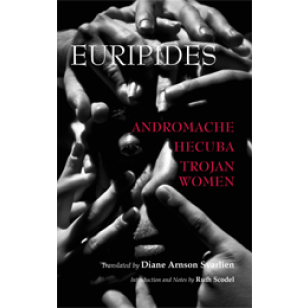Andromache, Hecuba, Trojan Women
Diane Arnson Svarlien’s translation of Euripides’ Andromache, Hecuba, and Trojan Women exhibits the same scholarly and poetic standards that have won praise for her Alcestis, Medea, Hippolytus. Ruth Scodel’s Introduction examines the cultural and political context in which Euripides wrote, and provides analysis of the themes, structure, and characters of the plays included. Her notes offer expert guidance to readers encountering these works for the first time.
Includes the unabridged text of Diane Arnson Svarlien's Hecuba, a translation featured in Patrick Wang's critically acclaimed film, A Bread Factory.
"Wang tracks a scene from a Bread Factory production of Hecuba from an uncertain rehearsal, to a breakthrough for its actors, to a searching discussion of the text and the characters, to a final performance so thrilling that I found myself wishing, while watching, that Wang would just shoot the whole play. Happily, he lets this Hecuba keep going." —Alan Scherstuhl, LA Weekly
To see Patrick Wang's article "Hecuba: A Film Record" in Didaskalia, click here. To see clips from the Arnson Svarlien Hecuba featured in A Bread Factory, click here.
Diane Arnson Svarlien’s translation of Euripides’ Andromache, Hecuba, and Trojan Women exhibits the same scholarly and poetic standards that have won praise for her Alcestis, Medea, Hippolytus. Ruth Scodel’s Introduction examines the cultural and political context in which Euripides wrote, and provides analysis of the themes, structure, and characters of the plays included. Her notes offer expert guidance to readers encountering these works for the first time.
Reviews:
"(The) Introduction is strong. . . . The footnotes provide all the necessary information a new reader might require, including topical mythological details but also more explanatory information. . . . The translations themselves are delightful. . . . In Andromache, Arnson Svarlien has captured the poetry of the choral odes while using accessible language. The rich emotions of the characters are nicely portrayed, from the furious fighting spirit of old Peleus to Hermione's despair at being abandoned by her father, to Andromache's quiet resistance. Similarly in Hecuba, the sorrow of the first half is violently overthrown by the rage of the second. And the raw, unrelenting despair is offset only by the joyous hymn that Cassandra sings."
—Kathryn Mattison, McMaster University, in Mouseion
Includes the unabridged text of Diane Arnson Svarlien's Hecuba, a translation featured in Patrick Wang's critically acclaimed film, A Bread Factory.
"Wang tracks a scene from a Bread Factory production of Hecuba from an uncertain rehearsal, to a breakthrough for its actors, to a searching discussion of the text and the characters, to a final performance so thrilling that I found myself wishing, while watching, that Wang would just shoot the whole play. Happily, he lets this Hecuba keep going." —Alan Scherstuhl, LA Weekly
- To see Patrick Wang's article "Hecuba: A Film Record" in Didaskalia, click here.
- To see clips from the Arnson Svarlien Hecuba featured in A Bread Factory, click here.
Acclaim for Diane Arnson Svarlien’s Euripides: Alcestis, Medea, Hippolytus:
"Diane Arnson Svarlien's body of work means a quantum leap forward in the vibrancy and immediacy of classical verse drama. I first learned of her work when I was searching, madly, for a translation of Medea for a production I had been hired to direct. I sought out every published version. I tried to track down any unpublished ones rumored to exist. All the others were wanting; her translation was revelatory. Merely read her translation of the play, then read another. You will sense the difference. This is particularly true if you are a practitioner of theatre."
—Patrick Wang, Director of Diane Arnson Svarlien's Medea in its world premiere at the Stella Adler Studio, and of the feature film In the Family, nominated for a "Best First Feature" Independent Spirit Award. Retrieved from monkeyatatypewriter.com.
"Arnson Svarlien’s translations are an ideal introduction to Euripides for students with no Greek and little knowledge of the ancient world. They remind me of why I love Euripides.”
—Laurel Bowman, Department of Classics, University of Victoria
"Provides thoughtful, clear and sprightly translations of the works included. Arnson Svarlien has made an effort to provide a given Greek word with a consistent English translation throughout. Hence, for example, aidôs usually appears as ‘reverence,’ sôphrosynê as ‘wise restraint.’ However, as she says, ‘total consistency in this regard is neither possible nor desirable.’ She has used iambic pentameters to correspond to Euripides’ trimeters and anapests to correspond with anapests; for the lyric passages, she has not necessarily followed Euripides metrically, but has very successfully attempted to incorporate responsion between strophes and antistrophes. These efforts are one of the great attractions of the volume.
"There is a great clarity and simplicity to many of the verses. The translations run smoothly and represent well the snap of Euripidean stichomythia, the rhetorical bent of his speeches, and the graceful yearning characteristic of his odes."
—Jennifer Clarke Kosak, New England Classical Journal
"This is the Medea we have been waiting for. It offers clarity without banality, eloquence without pretension, meter without doggerel, accuracy without clumsiness. Arnson Svarlien has shown herself exceedingly skillful in making Euripides sound Euripidean."
—David M. Schaps, Bryn Mawr Classical Review
"Arnson Svarlien’s Medea reveals a translator who can write with genuine distinction, in proper sentences, with a rare sense of rhythm."
—Malcolm Heath, Greece and Rome
About the Authors:
Diane Arnson Svarlien earned her PhD in Classics at The University of Texas at Austin and lives in Lexington, Kentucky.
Ruth Scodel is the D. R. Shackleton Bailey Collegiate Professor of Greek and Latin, University of Michigan.
To view a complete listing of Hackett ancient Greek tragedies in translation, please click HERE.








